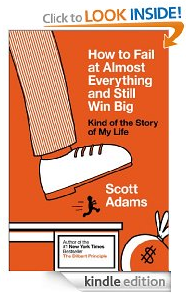Goals are for losers…
"Goals are for losers" is the title of
a section in my new favorite book...
"How To Fail At Almost Everything and Still
Win Big: Kind of the Story of My Life."
The author is Scott Adams, the cartoonist
who does the comic strip Dilbert.
I got the book from my local library but
then bought a copy for my Kindle and
then an audio book version so I could
listen on the go.
What I particularly like about Scott Adams
is that it wasn't his lifelong dream to become
a famous and wealthy cartoonist.
He wanted to be rich and positively impact a
lot of people and he didn't care much how he
got there.
His book lists a bunch of money-making things
he tried and failed. Cartooning was simply
something he tried that worked!
Here are some of my favorite quotes from the
book... this is a bit long but if you like
what you read, see if you can find the book
at your local library or grab a copy for
your kindle...http://amzn.to/19M0RMN
-"Failure is where success likes to hide in plain
sight. Everything you want out of life is in the
huge, bubbling vat of failure. The trick is to
get the good stuff out."
-"Dilbert started out as just one of many get-rich
schemes I was willing to try. When it started to
look as if it might be a success, my passion for
cartooning increased because I realized it could
be my golden ticket."
-"Success caused passion more than passion caused
success."
-"And since timing is often hard to get right unless
you're psychic, it makes sense to try different things
until you get the timing right by luck."
-"To put it bluntly, goals are for losers. That's
literally true most of the time. For example, if
your goal is to lose 10 pounds, you will spend
every moment until you reach the goal - if you
reach it at all - feeling as if you were short
of your goal. In other words, goal oriented people
exist in a state of nearly continuous failure that
they hope will be temporary."
"That feeling wears on you. In time, it becomes
heavy and uncomfortable. It might even drive
you out of the game."
"The systems versus goals point of view is burdened
by semantics, of course. You might say every
system has a goal, however vague. And that would
be true to some extent. And you could say that
everyone who pursues a goal has some sort of system
to get there, whether it is expressed or not."
"You could word-glue goals and systems together
if you choose. All I'm suggesting is that thinking
of goals and systems as very different concepts
has power. Goal-oriented people exist in a state
of continuous pre-success failure at best and
permanent failure at worst if things never work
out."
"Systems people succeed every time they apply
their systems, in the sense that they did what they
intended to do. The goals people are fighting the
feeling of discouragement at each turn."
"The system's people are feeling good every time
they apply their system. That's a big difference in
terms of maintaining your personal energy in the
right direction."
"For our purposes, let's say a goal is a specific
objective that you either achieve or don't sometime
in the future. A system is something you do on a
regular basis that increases your odds of happiness
in the long run. If you do something every day,
it's a system. If you're waiting to achieve it
someday in the future it's a goal."
NEW HERE
-The only way to succeed in the long-run is by
using a system that bypasses your need for
willpower.
-"In my experience, any form of exercise that
requires willpower is unsustainable...in the long-run
any system that depends on your willpower will fail.
-Every new skill you acquire doubles your odds of
success.
-"Another big part of my system involves generating
lots of opportunities for luck to find me and taking
the sort of risks that will allow me to come out
ahead even if the project fails."
-"All I know for sure is that I pursued a conscious
strategy of managing my opportunities in a way that
would make it easier for luck to find me."
-"I was the kind of person who needed a job that made
other people happy, ideally with a side benefit of
making me rich and famous too. And for that I needed
a system."
-"The idea was to create something that had value and-
this next part is the key- I wanted the product to
be something that was easy to produce in unlimited
quantities. I didn't want to sell my time, at
least not directly, because that model has an
upward limit."
-"My plan...I would try one thing after another until
something creative struck a chord with the public.
Then I would reproduce it like crazy. In the near term
it would mean one failure after another. In the long-term
I was creating a situation that would allow luck to find me."
-"My system of creating something the public wants and
reproducing it in large quantities nearly guaranteed a
string of failures. By design, all of my efforts were
longshots. Had I been goal oriented instead of system
oriented, I imagine I would've given up after the first
several failures. It would've felt like banging my head
against a brick wall. But being systems oriented, I felt
myself growing more capable every day, no matter the fate
of the project I happened to be working out. And every
day during those years I woke up with the same thought,
literally, as I rub the sleep from my eyes and slapped
the alarm clock off. Today's the day."
His happiness formula:
-Eat right
-Exercise
-Get enough sleep
-Imagine an incredible future (even if you don't believe it)
-Work toward a flexible schedule
-Do things you can steadily improve at
-Help other (if you've already helped yourself)
-Reduce daily decisions to routine
***
OK...that's enough!
More details on the book here:
I'll be hearing from his publisher's attorney if I
excerpt much more.
I just really love the message here.
Do lots of stuff...that have reasonable odds of
success...that don't cost too much in terms of
time or money and give luck a chance to find
you.
This reminds me of Thomas Edison...
He has at least three very famous quotes attributed to him…
“I have not failed. I’ve just found 10,000
ways that won’t work.” (light bulb)
“Genius is one percent inspiration and
ninety-nine percent perspiration.”
“Opportunity is missed by most people because
it is dressed in overalls and looks like work.
NOT THE WHOLE STORY
What most people don’t realize about Edison is
that he, personally did NOT find 10,000 ways
that didn’t work to invent the lightbulb.
He had dozens of helpers or “muckers” as they
were called, who worked for him to build and
test his ideas.
There is actually some dispute about the number
used in Edison’s quote…999…1000…3000… whatever
the number, the big lesson to take away from
Edison is that while genius may be 1% inspiration
and 99% perspiration it doesn’t all have to be
YOUR perspiration.
Have you ever tried anything 1000, 3000 or
10,000 times BEFORE you got it to work?
That’s a lot of “swings of the bat” without
a hit. (ALERT: I've switched to a sports
analogy...baseball)
Me?
I’m usually on to something else before the 10th “swing”.
But learning the true story behind Edison’s 10,000
“swings”, got me to thinking about applying it to
my life and business.
I decided that I would take 10,000 "swings" in 2014.
Correction: I would be RESPONSIBLE for getting
10,000 swings taken on my behalf in 2014.
That works out to an average 28 "swings" a day.
I'm taking at least 10,000 steps a day since I
got my new peodometer but I'll have to take
those "swings" myself.
As for "swings" in my business, the goal for those
will be to:
-Get me more "loyalty club" clients
-Sell more of my products and services
-Get more affiliates for my products
-Get media coverage for my stuff
"Swings" might include...
-Phone calls
-Emails
-Postcards
-Letters
-Faxes
Anything that goes out in the hopes of
getting a positive response.
I can safely say I've never taken 10,000 swings
in a year, perhaps in 3-5 years...I've never
kept track.
So, at the moment I'm pondering...
"How can 28 "swings" be taken FOR me
every day without it costing me much
money... preferably before I wake up
in the morning?"
I don't have an answer yet and by the
time I get one it might be some time
in February or March so my per day
"swing" count may have to rise.
I could probably send 28 emails a day
myself for example, but that's not a
good long-term solution.
It takes time to research who to send to,
what to say etc.
I need to develop a system that gets those
X number of "swings" taken every day on as
close to auto-pilot as possible.
Actually 10,000 "swings" in one year is the
first step. Then 10,000 in a month becomes
the target.
Anyway, this is what “How To Fail At Almost
Everything and Still Win Big” has got me
contemplating.
How about you?
If you've got a smartphone here is a great
treasure hunt you can do.


Thanks Leo, very inspirational and thought provoking. I’m off to the library to find the book.